Recently I read several books in a row on China – Jianying Zha’s Tide Players, Bill Hayton’s The South China Sea, and Louisa Lim’s The People’s Republic of Amnesia. My order of David Shambaugh’s China Goes Global is on its way and I haven’t touched Kevin Kwan’s Crazy Rich Asians, a comedy about Chinese-Americans, Singaporean Chinese, and China’s Chinese. Kwan’s latest novel is titled China Rich Girlfriend.
It was not by design. I would have liked to read more non-academic, award-winning books on Japan, South Korea, Hong Kong, Singapore and Indonesia, but this year I’ve learned facts about China more than I would like to. Certainly there are also great titles on other countries, such as Sonny Liew’s The Art of Chan Hock Chye, Euny Hong’s The Birth of Korean Cool, and Elizabeth Pisani’s classic Indonesia Etc. But the book market mirrors the news, and over the last decade China has taken center stage on international politics and economics, sidelining Japan.
It is natural for a person with Chinese background to feel proud of China. World history teaches that China is one of the richest places in the world for most of history. In Southeast Asia, ethnic Chinese form considerable portion of each nation’s elite and middle class.
On the other hand, overseas Chinese traditionally had mixed feelings about China. People’s Republic of China was accessible to the outside world probably only in early 1990s. For my little self, the Tiananmen Square Massacre of 1989 went against the wind of change that swept Europe and ended the Cold War. Although Indonesia and other Southeast Asian nations opened diplomatic relations with the People’s Republic soon, public suspicion of China remained and Hong Kong stayed as the center of modern Chinese civilization throughout the 1990s.
The first Chinese citizens I met were graduate students who took the same English class with me in Australia. I found them more approachable than the Taiwanese and more down-to-earth than the Hong Kongers. They were urban women from Beijing, Shanghai, and Shenzhen, some with aspiration of settling in Australia after their studies. A married man, however, caused the class to laugh nervously after he suggested that war is a more effective way to deal with the surplus of China’s single men than say, migrating overseas and/or marrying foreigners.
Every time I returned home for holiday in early 2000s, I saw how China grew to be more prosperous and more important. I was impressed that China could complete a manned space shuttle mission, and the 600th anniversary of Zheng He’s intercontinental voyage showed that Columbus’ achievements were decades behind China’s.
China’s coming of age as a great power came with the 2008 Summer Olympics in Beijing. I was so proud that for first time in history China could top the medal tally, above United States and Russia. After publishing a positive article on the games, however, for the next two years the rise of China would dismay me.
One important factor of modern Chinese nationalism is the angry public who don’t demonstrate in front of foreign embassies or the palace, but instead take their rage online against perceived enemies of China. While they channel their frustration on outsiders instead of the government, their anger helps popularizing the government’s narrative that the Communist Party has recovered China’s honor after “a century of humiliation” by the West and Japan.
In the 21st century, no one outside China believes that China is a communist country anymore. The government maintains Communism’s party dictatorship and national surveillance, but China has become an industrial superpower, producing virtually everything you touch today and making profitable brands such as Lenovo, Xiaomi, and Li Ning. Indonesian cosmopolitans often spend nights in colorful and breathtaking Shanghai, Guangzhou, and Chengdu.
I have lost contact with my friends from China, but I follow several journalists based in Hong Kong and China, and also several American academics studying China. None of them is impressed with China. Many Hong Kongers are worried that it will become “another Chinese city”. Hong Kong is currently the only safe place for them to share their opinions and information on China with the world, although journalists and academics now can stay in China and interview Chinese people (often clandestinely).
What still puzzles me is how activism fares in China. There seems to be more high profile activists in the country than in Japan or South Korea, but that is because they have been arrested. Last year Chinese authorities arrested five feminists and released them after an international campaign, though the government continues to keep them under surveillance. For the government, their fault is not being feminists but being activists.
Meanwhile, while Japanese and Korean feminists are basically free to do anything, they are generally unheard of internationally. The good news is the Chinese public can be outspoken at the right time, just like when violence against woman happens and when officials try to demean the president of Taiwan.
I understand that some of us have found a better life in China. It can be a more liberating place than Indonesia, away from nosy family and the religious society. The inconvenience of the Great Firewall can be overcome with a little trick, and the locals are friendly once you’ve known them (although people I know seem to hardly befriend any Chinese citizen).
But unfortunately I cannot be impressed with China. On the eve of the Tiananmen anniversary, I had a short Twitter conversation with Louisa Lim and American scholar Leta Hong Fincher on how Chinese youth are ignorant about what happened in 1989 (in contrast to Indonesian youth who want to learn about 1965 and 1998), and those who’ve known the story argue that the massacre was necessary to guard China’s economic and political progress.
Once again, the loss of humanity is seen as a worthy price for stability and pride. The more I learn the history of China, the more I realize that the current government only continues what the Celestial Empire has done for millennia.
Read Mario’s take on media, state and sex crimes and follow @mariorustan on Twitter.
*Photo by Yosomono









Comments